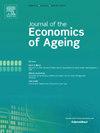Navigating demographic challenges: The impact of increasing social contribution rates on tax revenue and distribution
IF 2
3区 经济学
Q2 DEMOGRAPHY
引用次数: 0
Abstract
The demographic transition poses significant fiscal challenges to pay-as-you-go social security systems, particularly in ageing societies like Germany. While extensive research has analyzed the direct effects of demographic change on rising contribution rates, the secondary effects of the income tax system that arise from the deductibility of contributions have received little attention. This study addresses this gap by examining how the tax treatment of social security contributions influences distribution of the demographic burden. Based on detailed microdata from the German Income and Expenditure Survey (EVS) and official income tax statistics, we apply a generational accounting framework to analyze intergenerational redistribution effects. As a secondary finding, we also identify intragenerational redistribution resulting from the tax deductibility of proportional social security contributions under a progressive income tax schedule. Our findings reveal that future generations are disproportionately affected by declining income tax revenues, while current generations benefit from an average tax relief of 47 percent. Moreover, a regressive burden distribution is indicated: individuals in the lowest income quintile face an effective burden of 91 percent, as compared to 62 percent in the top quintile. These results underscore the importance of accounting for indirect tax effects when evaluating the long-term sustainability and equity of social insurance reforms.
应对人口挑战:提高社会贡献率对税收收入和税收分配的影响
人口结构的转变给现收现付的社会保障体系带来了重大的财政挑战,尤其是在德国这样的老龄化社会。虽然广泛的研究分析了人口变化对缴款率上升的直接影响,但由于缴款可扣除而产生的所得税制度的次要影响却很少受到注意。本研究通过考察社会保障缴款的税收待遇如何影响人口负担的分配来解决这一差距。基于德国收入和支出调查(EVS)和官方所得税统计的详细微观数据,我们应用代际会计框架来分析代际再分配效应。作为第二个发现,我们还确定了代际再分配,这是由累进所得税计划下按比例缴纳的社会保障缴款的税收抵扣造成的。我们的研究结果表明,未来几代人受到所得税收入下降的影响不成比例,而当代人则受益于平均47%的税收减免。此外,还指出了一种递减的负担分布:最低收入五分之一的个人面临91%的有效负担,而最高收入五分之一的个人则为62%。这些结果强调了在评估社会保险改革的长期可持续性和公平性时考虑间接税影响的重要性。
本文章由计算机程序翻译,如有差异,请以英文原文为准。
求助全文
约1分钟内获得全文
求助全文
来源期刊

Journal of the Economics of Ageing
Multiple-
CiteScore
4.10
自引率
4.50%
发文量
46
审稿时长
49 days
期刊介绍:
The Journal of the Economics of Ageing (JEoA) is an international academic journal that publishes original theoretical and empirical research dealing with the interaction between demographic change and the economy. JEoA encompasses both microeconomic and macroeconomic perspectives and offers a platform for the discussion of topics including labour, health, and family economics, social security, income distribution, social mobility, immigration, productivity, structural change, economic growth and development. JEoA also solicits papers that have a policy focus.
 求助内容:
求助内容: 应助结果提醒方式:
应助结果提醒方式:


